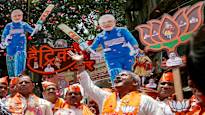The opposition did surprisingly well. Modi will continue as prime minister, but will have to make changes in his management style, says Mikko Leppänen, a foreign journalist familiar with India.
Mikko Leppänen, foreign editor
The biggest election in the world is over in India. The result of the parliamentary elections is partly expected and at the same time surprising.
Prime minister Narendra Modi’s the Hindu nationalist and right-wing Indian People’s Party BJP and its allies won the election as expected.
Modi will continue as Prime Minister for a rare third term. He has become perhaps the most prominent political leader of independent India.
But the landslide victory sought by the Indian People’s Party remained a dream.
In the video below, residents of Modi’s hometown of Vadnagar and an analyst assess the prime minister’s success.
Preliminary result according to the BJP and its allies will get a total of around 300 seats in the Lok Sabha, the lower house of Parliament.
543 representatives sit in the Lower House. The winner needs 272 seats to form a government.
In the previous parliamentary elections of 2019, Modi’s coalition won a total of 352 seats. Of those, 303 went to the BJP. This allowed the BJP to form the government alone and concentrate power in Modi’s hands.
So Modi’s party seems to be losing dozens of seats. Therefore, BJP is unlikely to form the government on its own, so it becomes dependent on allies.
This sets Modi’s new kind of situation, he writes British broadcasting company BBC.
Having served as prime minister for ten years, Modi is used to leading majority governments and pushing through reforms at a fast pace.
In the future, he will have to listen to his allies and possibly make concessions in order to secure the passage of his own top projects. At the same time, decision-making can slow down and the implementation of projects can become more uncertain.
During the previous two terms, Modi’s government has made large investments in infrastructure, for example. In the future, they may no longer be the same way of shouting things out.
The market reacted immediately on Tuesday as the new reality began to cement itself. Indian stock prices plunged.
The former ruling party The opposition coalition INDIA, led by the Congress Party of India, managed to make a huge final run.
Both the Congress party and regional parties in several states increased their support.
The opposition is unexpectedly winning in the important Uttar Pradesh. With 250 million inhabitants, it is the most populous state in India. At the same time, it is one of the poorest states in India.
Prime Minister Modi’s own constituency is located in Uttar Pradesh, in the spiritual capital of Hindus, Varanasi.
BJP and Modi are campaigning hard in Uttar Pradesh. At the beginning of the year, Hindu nationalists staged a huge spectacle when Modi opened the controversial Rama temple in the city of Ayodhya. It was believed to contribute to BJP’s electoral success.
However, the opposite happened. At the time of writing, the BJP candidate is about to lose to a regional party candidate in the constituency that includes Ayodhya.
Also the opposition and its front image, the Congress party Rahul Gandhi, invested heavily in campaigning in Uttar Pradesh. The fall of the state in the arms of the opposition is a setback for Modi.
Gandhi’s election tours through India, dubbed “pilgrimages”, seem to have borne fruit. The Congress party has significantly increased its support in the states visited by Gandhi, writes the newspaper The Times of India.
It seems that Modi’s carefully constructed public image took a dent when Gandhi managed to challenge him and the BJP’s predicted landslide failed to materialise.
During the election campaign Modi and the BJP used rhetoric pitting the Hindu majority against the Muslim minority.
This has of course pleased the nationalist section of Hindus. But at the same time, it has divided the nation and alienated Muslim voters, who might have been pleased by the BJP’s economic policies and subsidies to the poor.
Hindu nationalists seek to transform India into a Hindu state. According to the constitution, India is a secular state. The opposition presented in its campaign that the BJP is seeking to change the country’s constitution.
The decline in BJP’s popularity may indicate that a more secular section of Hindus has turned their backs on the aspirations of Hindu nationalists.
In the upcoming election period, it will be significant, among other things, in which direction the nationalism of Indians and the relations between the Hindu majority and the Muslim minority will develop.
